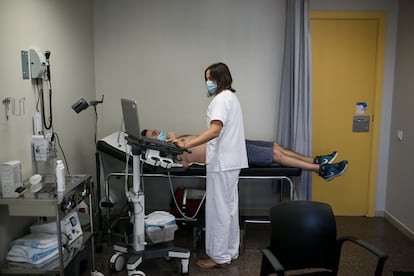Why do men go to the doctor less often, and how does it affect their health?
Some scholars suggest an outdated idea of masculinity that views seeking medical help as weakness or loss of power. But others point to a lack of sufficient studies comparing men and women with similar ailments

Men’s life expectancy is lower than women’s. They are more likely to die in an accident or by suicide. But a glance at the waiting room of any health center would suggest that men do not have many medical problems, as there are far fewer of them to be seen. And that is precisely part of the problem.
Benno de Keijzer, a doctor and professor of anthropology specializing in gender studies at the Autonomous University of Mexico, sums it up eloquently: “Men usually go to the doctor when they are young, up to the age of 13. Then they disappear, reappearing when they are around 60, and already with some ailments, ” he explains. “The great exception is the young people and teenagers we find on Friday and Saturday nights, populating the emergency services of hospitals.”
It is an out-of-date idea of masculinity: only going to the doctor’s when you have an advanced health problem. “Many men inhabit their body as if it were a machine,” reflects De Keijzer. “It’s like the phrase ‘until the body holds out’, which is applied to alcohol, sex, health... It implies viewing your body as a tool. And that makes it difficult to practice self-care or avoid risk factors.”
De Keijzer, author of several studies on the subject, points out another factor: “Historically, care has been feminized. Women have to take care of children and the elderly, and there is a close relationship between hetero-care and self-care.” Anastasia Téllez, an anthropologist and director of the Observatory of Masculinities, a research department of Spain’s Miguel Hernández University, notes that age, education and context are important. “There are many ways of understanding masculinity,” she says in a telephone conversation. “And there are many men who, once they start to have children or take care of their own parents, embrace the act of caregiving like never before. They incorporate new habits and later apply them to themselves.”
But there is still a widespread notion that many men avoid going to the doctor for fear of losing control, of being ordered to go on a diet or take pills, or of receiving a fatal diagnosis. “Many continue to see it as a sign of weakness that the doctor, and even more so if it is a female doctor, has the power to change their lifestyle,” explains Téllez. It is the type of men who do not wear a helmet if they work at a construction site, and who are likely to say: “I never missed a day of work, not even with a fever of 40ºC.” It is a concept of masculinity associated with risk, courage and strength, says Téllez.
Numerous studies in recent years have underscored this relationship between ideology and a reluctance to go see the doctor. As the psychologist Diana Sánchez points out, biological differences between men and women have been studied to explain why they live longer. Their psychological differences have also been analyzed to understand why men commit suicide more. “But one possible explanation is that men are more reluctant to go to the doctor. And once they go, they are less honest.”
The fear of looking 'down there'
According to the 2022 Merck Survey: Men, Cancer and Taboos, men undergo much fewer preventive check-ups than women, 43% compared to 61%. Differences in screening for specifically male and female cancers are apparent: 60% of men do not get their prostate checked as often as required, while only 24% of women avoid the cervical test.
“It’s because of fear, misinformation, virility... and the fact that we don’t like being looked at down there,” explains Mario Domínguez Esteban, a urologist at Marqués de Valdecilla University Hospital in Spain, who also points to an educational issue. “Women are used to going to the doctor. From a young age they begin to see the gynecologist every year, because they have been told that there are risks of cancer and they have internalized this message. This has not been equally transmitted to men.”
It is starting to be done, however. Brazil, Ireland and Australia have awareness programs on the need to go to the doctor specifically aimed at men. At a global level, there is also Movember, a movement dedicated to raising awareness and funds to accelerate research into diseases that affect men, such as prostate and testicular cancer.
But it is difficult to change internalized habits with ads and campaigns. Women start to see the gynecologist between the ages of 13 and 15. A man’s first visit to the urologist is usually after 45. Women get used to painful and invasive examinations from their teens, while men view any intervention with terror. “Many men are afraid of what we may do to them in the urological check-up, the rectal examination,” confirms Dr. Domínguez. “And it’s something that is sometimes necessary, but it’s not always the case.”
Domínguez sees it daily in his office. “Many men don’t feel the need to go to the doctor until they feel unwell. And many do not come of their own volition, but forced. I come across 50-year-old patients who say: ‘I feel great, but my partner has forced me to come.’”
However, the idea that men are more reluctant to go to the doctor has its detractors. Luis Llanes, head of urology at Getafe Hospital in Spain, points to different medical studies to argue that “there are important exceptions to this general opinion, because there are few studies of the general population in which the patterns of men and women with similar medical conditions have been compared.” It does not make sense to compare breast cancer (which affects young women and is overcome in 90% of cases) or cervical cancer (with a survival rate of 67%) with prostate cancer (which affects older men and has a survival rate of 85%) or testicular cancer (95%). There are other factors, explains Dr. Llanes, such as employment, family size or marital status, which, according to some experts, could be important in explaining gender differences when it comes to seeing the doctor.
Sign up for our weekly newsletter to get more English-language news coverage from EL PAÍS USA Edition
Tu suscripción se está usando en otro dispositivo
¿Quieres añadir otro usuario a tu suscripción?
Si continúas leyendo en este dispositivo, no se podrá leer en el otro.
FlechaTu suscripción se está usando en otro dispositivo y solo puedes acceder a EL PAÍS desde un dispositivo a la vez.
Si quieres compartir tu cuenta, cambia tu suscripción a la modalidad Premium, así podrás añadir otro usuario. Cada uno accederá con su propia cuenta de email, lo que os permitirá personalizar vuestra experiencia en EL PAÍS.
¿Tienes una suscripción de empresa? Accede aquí para contratar más cuentas.
En el caso de no saber quién está usando tu cuenta, te recomendamos cambiar tu contraseña aquí.
Si decides continuar compartiendo tu cuenta, este mensaje se mostrará en tu dispositivo y en el de la otra persona que está usando tu cuenta de forma indefinida, afectando a tu experiencia de lectura. Puedes consultar aquí los términos y condiciones de la suscripción digital.









































